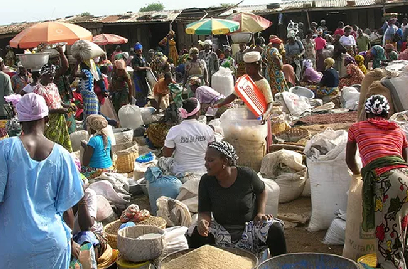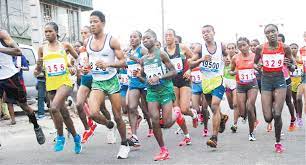Nigerians, in Accra, in Kumasi, and in other cities in far away Ghana, are tasting the harvest of the Ghana-Must-Go (GMG) seed sowed in Nigeria in the harassment and expulsion of Ghanaians in the heady days of oil boom in the 1980s.
In those years of Shehu Shagari as president, Nigerians wanting to protect their quarry saw Ghanaian shoe makers, tailors, teachers, and well diggers as parasites; even as they were temporarily fleeing their country as Jerry Rawlings grappled with a bad economy.
The Nigerian campaign was not legislated. It was a verbal expression of animosity against Ghanaians, who were so poor all their possessions were contained in one black carrier bag.
But the seed has now grown into a tree and produced a draconian version in a law that leaves Nigerians, some of whom have lived in Ghana for two decades, worse off.
A Nigeria-Must-Go (NMG) wish which began as a day-dream whispered in private is subtly but fast gaining resonance in widening circles of the Ghanaian society, with Nigerian traders the first victims.
NMG intends to salvage Ghana’s dwindling economy, and reciprocate the GMG campaign which saw the expulsion of many Ghanaians from Nigeria.
At issue is the revised Ghana Investment Promotion Council (GIPC) Act 865 which recently raised the minimum investible capital requirement for any foreigner in retail trade from $300, 000 to $1 million.
Traders have been ordered to meet the $1 million capital or risk imprisonment and or deportation.
GIPC Act
Parts of the GIPC Act Nigerian traders consider nightmarish include
• Section 27. Says a person who is not a Ghanaian, or an enterprise which is not wholly Ghanaian-owned, shall not invest or participate in the sale of goods or provision of services in a market, petty trading or hawking or selling goods in a stall at any place.
• Section 28. No non-Ghanaian may engage in a trading enterprise if he invests in the enterprise not less than $1 million in cash or goods and services relevant to the investment.
• Section 28 (3). Trading includes the purchasing and selling of imported goods and services.
• Subsection 28 (2). Foreigners in retail trade are required to employ at least 20 skilled Ghanaians.
Nigerian shop owners in fear
Thousands of members of the Ghana Union of Traders Association (GUTA) in the country’s political capital, Accra, and in the commercial capital, Kumasi, recently turn up the pressure by locking up shops owned by Nigerians.
Nigerian traders at the popular markets in Makola, Kaneshie, Agbogboloshie, Okaishie, Tudu, and Kantamanto in Accra; Suame market in Kumasi; and other major markets across Ghana’s 10 regions live in trepidation of what next to expect from other trade unions and the government itself.
Nigeria Union of Traders Association in Ghana (NUTAG) National President, John Ukala, moaned about the situation in his shop at Makola market in Accra.
“This is the business some of us (Nigerian traders) are into, while others sell bicycle parts and other products,” he said, fighting back tears as he pointed at trailer loads of imported used clothes about to be offloaded.
“I have been in Ghana for more than two decades. All my life all I have been doing is trading, like the rest of our members.
“We know that there are Ghanaians like me who have businesses and homes in Nigeria. Hundreds of them trade at Idumota, Alaba and many other parts of Nigeria without hindrance, without being asked to provide resident permit, among others.
“Why should they keep making life miserable for a fellow ECOWAS (Economic Community of West African States) member country like Nigeria because of trade?”
Walking back into his shop, filled with bundles of imported fairly-used clothes ready for sale to retailers, Ukala said Nigerian traders can no longer fathom their prospects in Ghana.
He identified the reason for the GIPC Act, the incessant threat to implement it, and the imbroglio between NUTAG and GUTA as market competition which favours Nigerians who have more customers because their goods are cheaper than those of Ghanaian traders.
He alleged that GUTA members pressured their legislators to revise the law to have foreign traders booted out in exchange for votes, adding that GUTA has rebuffed every peace move by NUTAG.
In October, NUTAG leaders, together with All Nigeria Community (ANC) President, Moses Owharo, and Eze Ndi Igbo of Ghana, Chucks Ihenetu, had a meeting with the Nigerian High Commissioner to Ghana, Ademola Onafowokan.
It led to another meeting between the Nigerian High Commission in Accra and the Ministry of Trade and Industry, where the Nigerian mission proposed that land be given to Nigerian traders to build their own market.
The Ghanaian government reportedly accepted the proposal in principle but is yet to give it effect.
Impact of global markets
Global markets offer important opportunities for companies in developing countries. By exporting to larger markets, companies increase production, growth, and employment at a faster pace than by focusing on smaller domestic markets.
But companies in developing countries must overcome severe hurdles to export to global markets.
In West Africa, both the process and degree of regional integration have lagged behind expectation, and political commitments have not been translated into policy and regulatory reform. Or reform is not implemented.
ECOWAS, founded in 1975, thus remains weakly integrated, with continuing tariff barriers and substantial non-tariff barriers.
Four decades after its founding, ECOWAS is yet to agree on a common external tariff, and the existing scheme for regional free trade faces significant challenges.
Ghana, a sovereign country, has the right to enact and implement whatever laws it deems fit to safeguard its economy for the benefit of its citizens.
The question is where to draw the line between Ghana’s right to sovereignty and its obligation to a supranational entity such as ECOWAS, of which it is a member.
What ECOWAS treaty anticipates
Article 3 (1) of the ECOWAS treaty on free movement of people and services seeks to raise living standards, maintain and enhance economic stability, foster relations among member states, and contribute to the development of the African continent.
The treaty requires member states to agree on
• Harmonisation and co-ordination of national policies and promotion of integration, projects and activities, particularly in food, agriculture and natural resources; industry, transport and communications, energy, trade, money and finance, taxation, economic reform, human resources, education, information, culture, science, technology, services, health, tourism, and legal matters.
• Establishment of a common market through a common external tariff and trade policy vis-a-vis third countries; removal between member-states of obstacles to the free movement of persons, goods, services and capital, and to the right of residence and establishment.
• Establishment of an economic union through common policies in the economic, financial, social, and cultural sectors, and the creation of a monetary union.
• Adoption of measures for the integration of the private sector, particularly the creation of an enabling environment to promote small and medium scale enterprises.
Deep links between Nigeria, Ghana
Ghana hosts the largest number of Nigerians anywhere in the world outside Nigeria. Ghana being the nearest English-speaking country to Nigeria in ECOWAS, makes it an attractive destination for Nigerians.
There are 200,000 Ghanaians in Nigeria, 15 per cent of Ghanaians living outside Ghana, according to the International Organisation on Migration (IOM).
Just as Nigerian traders in Ghana allege hostility from their hosts, Ghanaian exporters also complain mostly about the difficulties in accessing the Nigerian goods market due to unfavorable product registration process, trouble in transporting goods across Benin and Togo as well as corruption in the Nigerian Customs Service.
These complaints are contrary to ECOWAS treaties and protocols.
Regardless, as the two largest economies in West Africa, Nigerian-Ghanaian relations are crucial for the region. Trade ties are important, and Nigeria’s high levels of liquidity serve as an important source of capital for Ghana.
Nigeria is the largest economy in ECOWAS, followed by Ghana, and are also the two biggest oil producers in the region, although the difference in output is immense.
Nigeria was Ghana’s third most important trade partner in 2010, accounting for almost 10 per cent of total Ghanaian foreign trade.
Ghana, in turn, was Nigeria’s ninth largest trade partner that year, accounting for some 1.3 per cent of Nigerian trade (including 1.9 per cent of exports). Nigeria has also been a very important source of investment in Ghana.
In recent years, several Nigerian banks have set up shop in Ghana; as has Globacom, a Nigerian telecommunication company.
Therefore, it is crucial that the barriers to trade growth between the two countries are urgently and effectively addressed to deepen integration in the region and end the dangerous cat and mouse game of Ghana-Must-Go and Nigeria-Must-Go.
















